Oxford University Press's Blog, page 529
March 29, 2016
Climate and the inequality of nations
Countries grow richer as one moves away from the equator, and the same is generally true if one looks at differences among regions within countries. However, this was not always the case: research has shown that in 1500 C.E., for example, there was no such positive link between latitude and prosperity. Can these irregularities be explained?
It seems likely an answer can be found in factors strongly associated with latitude. Perhaps the strongest correlate of latitude is the extent of ultraviolet radiation (UV-R) that a country, or a region, is exposed to. The figure below illustrates the tightness of that link across countries and continents.

The correlation between UV-R and absolute latitude by country and continent by Carl-Johan Dalgaard, Pablo Selaya, and Thomas Barnebeck Andersen. Used with permission.
There is no mystery here, as UV-R is determined by the distance from the sun. But other factors matter too, especially elevation above sea level, and the extent of cloud cover.
Findings that UV-R turns out to impact cross-country differences in current economic prosperity, even when the influence from a range of factors that may influence the growth process are filtered out, or that may be correlated with UV-R – e.g., latitude, elevation, temperature, precipitation, and agricultural productivity, to name some. We find an impact from UV-R also within countries where economic activity is measured at various arbitrary levels of aggregation. For example, in exploring the differences among “virtual regions” of four degrees latitude by four degrees longitude, in this type of setting, we can additionally filter out the influence from country-specific characteristics and regional differences in cultural traits. Overall, this means that the impact of UV-R that is identified is unlikely to be convoluting the influence from factors like institutions, which hold a fundamental effect on economic development.
At this stage, one may have the sinking feeling that one mystery has been replaced by another: why would UV-R matter to economic development? We can rule out an impact via the risk of skin cancer and thus mortality, based on research in epidemiology and econometric tests. Explanations related to spurious correlations with, for example, (agro-) climatic conditions cannot account for the UV-R regularity either, since we always control for them. Instead, we propose a mechanism that relies on two main elements.
The first is that UV-R affects morbidity, according to an extensive epidemiological literature. Concretely, UV-R is a root cause of a cluster of debilitating eye diseases. Based on the premise that visual acuity is particularly important in skilled occupations, we propose that UV-R may have reduced the incentive to accumulate skills historically. The logic is simple: the less time one has to recuperate investments in accumulating skills, the lesser the incentive to spend one’s early life doing that. In fact, we are able to document that eye disease created a marked “gap” in work life expectancy between high and low UV-R regions, historically.
The second element derives from research showing that systematic differences in work life expectancy can have a strong influence on when the modern process of economic growth commences. “Latecomers” to this process are the poor countries of the world today. Indeed, a recent study shows that a country, where the work life expectancy of a skilled worker is five years shorter than another, will have its take-off to a path of sustained economic growth delayed by more than a century.
Accordingly, we propose that eye disease ecology in high UV-R regions reduced the incentive to invest in human capital in the past, and thus delayed the timing of the onset of modern growth. As a result, a UV-R gradient in prosperity was created.
We submit this mechanism to a demanding battery of tests, evaluating its plausibility both qualitatively and quantitatively. For example, we demonstrate that the UV-R gradient only emerges after the onset of modern growth, where the role of human capital presumably becomes first order. Hence, we would expect to see a strong negative link between UV-R and economic prosperity today. But, historically, where human capital was relatively less important, the same regularity would not be visible. This provides an account for the latitude regularities mentioned above.
We believe the proposed mechanism is a plausible reason why UV-R seems to predict contemporary income differences in a global perspective, indirectly explaining some of the observed correlations between latitude and current economic prosperity. It can also account for the historically changing nature of the link between latitude and prosperity. We obviously can’t rule out that other mechanisms might also be at work at the same time. Exploring the impact of UV-R on economic development is an interesting topic for future research, potentially shedding more light on the link between climate and the inequality of nations.
Headline image credit: clouds sky blue weather by PublicDomainPictures. Public domain via Pixabay.
The post Climate and the inequality of nations appeared first on OUPblog.

An eventful weekend at the 2016 Society for American Music conference
The 2016 Society for American Music (SAM) conference was held in Boston, where scholars and institutions from around the globe gathered together in a supportive and uplifting five-day meeting that consisted of panels, presentations, discussions, field trips, musical performances, receptions, and the celebration of books and authors. Marking my first time attending (and working at) a conference, #Sonneck2016 was an exciting place that focused on inclusion — cultivating and encouraging diversity in the field. I’m grateful for my time there, and for the opportunity to meet and speak with so many passionate people all in one space.
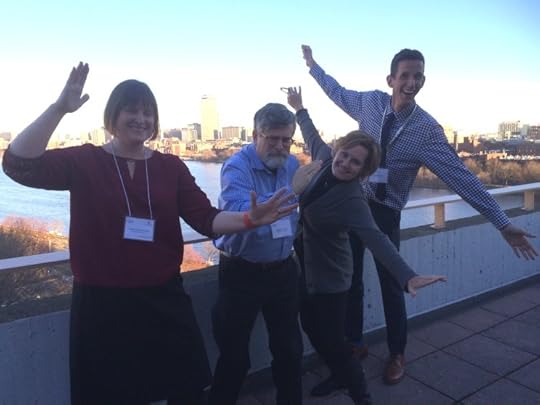
OUP Editors at SAM
OUP music editors get ready for takeoff.

The OUP booth at SAM
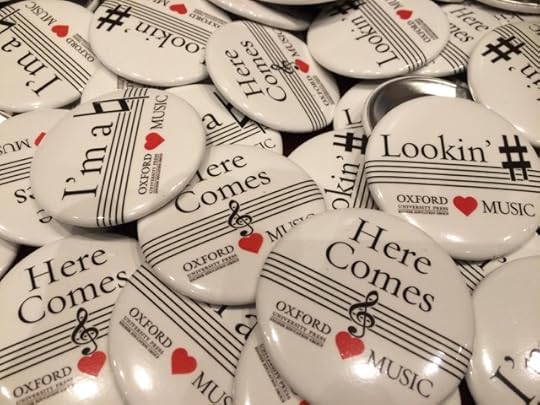
Music buttons
OUP music buttons, courtesy of editor Richard Carlin.
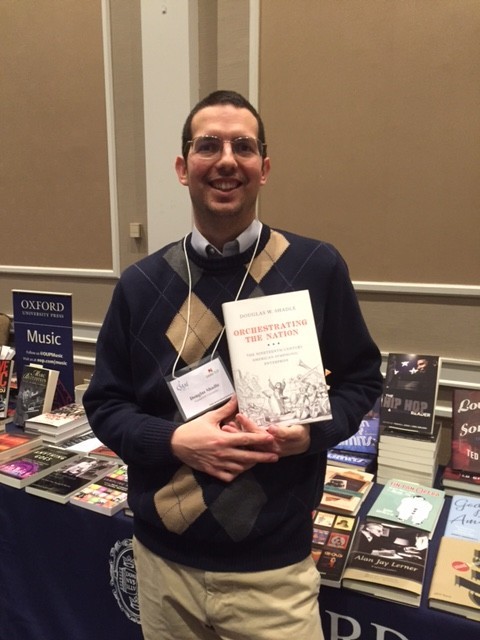
Doug Shadle
Doug Shadle poses with his first book, Orchestrating the Nation.
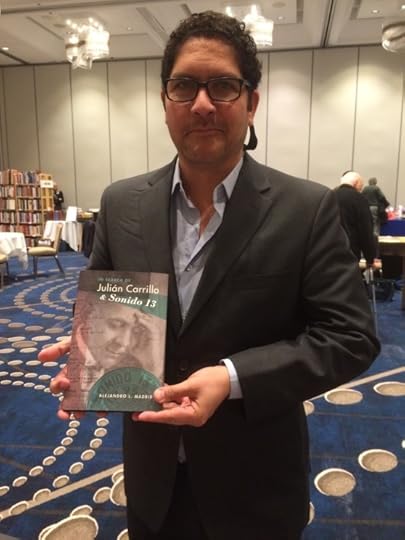
Alejandro Madrid
Alejandro Madrid poses with his book, In Search of Julián Carrillo and Sonido 13.

Benjamin Bierman
Benjamin Bierman poses with Listening to Jazz.
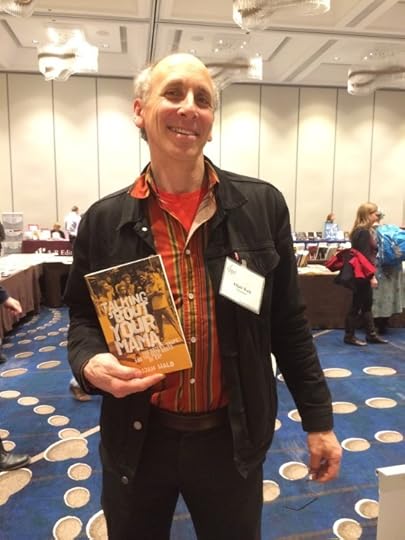
Elijah Wald
Elijah Wald proudly poses with his book Talking ‘Bout Your Mama.
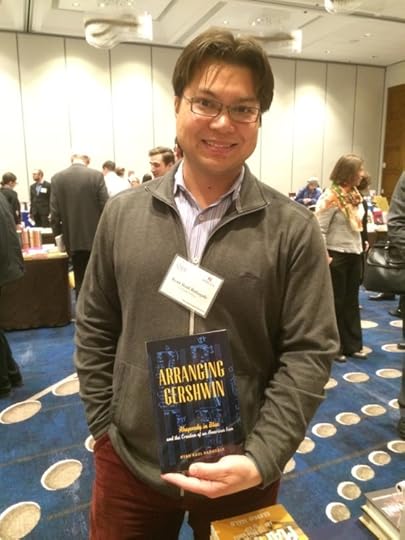
Ryan Bañagale
Ryan Bañagale and his book Arranging Gershwin.
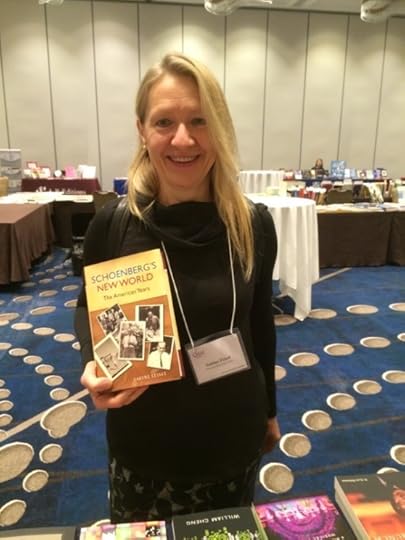
Sabine Feisst
Sabine Feisst and her book Schoenberg’s New World.
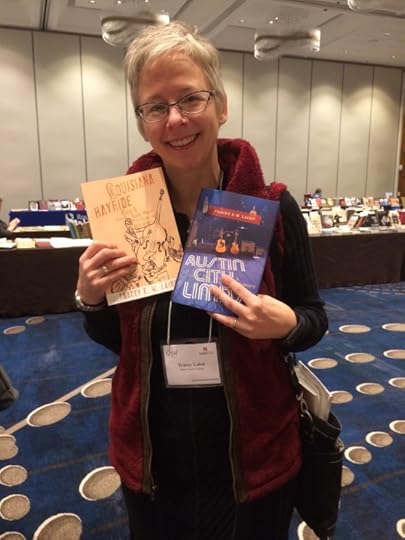
Tracey Laird
Tracey Laird holds two of her books: Austin City Limits and Louisiana Hayride.
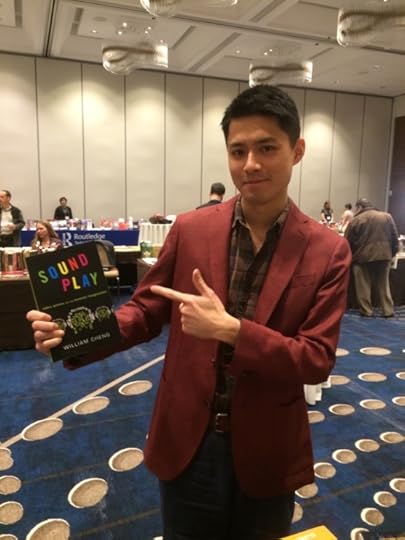
Will Cheng
Author Will Cheng pointing to his Sound Play.

Richard Carlin
OUP Higher Education editor Richard Carlin is also an author, standing here with his newest release.
Featured image: “Skyline Boston” by Rene Schwietzke. CC by 2.0 via Flickr. All other photos by Eden Piacitelli.
The post An eventful weekend at the 2016 Society for American Music conference appeared first on OUPblog.

Brexit in the city: what would be the impact of the UK becoming a third country state?
Mr Carney, Governor, Bank of England, was asked by the Treasury Select Committee what would be the impact of Brexit on the City: “I would say a number of institutions are contingency planning for that possibility (i.e. to relocate business activities from the City in the event of Brexit). There would be an impact. I can’t give you a precise number in terms of institutions or jobs or activity, because we don’t know where we would be on that continuum between full mutual recognition or pure third country access.” The Governor was pressed on whether anything less than mutual recognition would result in some degree of loss of business in the City of London. His response was, “without question.”
The City of London is not only Europe’s financial centre – according to think tank Z/Yen, London has leapfrogged New York to become the world’s leading financial centre. To put some numbers to this, the City is currently home to over 3000 securities firms (dealers, brokers and investment managers) regulated under the Markets in Financial Instruments Directive (MiFID). Well over 50 per cent of the EU’s MiFID firms are based in the UK, emphasizing its primacy as the EU’s securities hub.
But how to assess the consequence for these firms and the City of London if the UK votes to leave the EU, and in doing so the UK becomes, from an EU perspective, a third country state? There are parallels – think of Switzerland and international financial centres such as Jersey. How do they fare outside the EU when their financial institutions need to do business or service customers in the EU? The short answer is it’s not easy.
At present the UK has a direct influence over the decision making process in the European Commission, Parliament and Council. Most recently, the UK has been able to influence the development of Alternative Investment Fund Managers Directive (AIFMD), and ensure that the Directive provides protection for investors but without reducing investor choice.
As a third country state the UK’s ability to influence EU regulation would diminish. It can attempt to participate in the decision making process by raising points with a member state with which it has a favourable relationship, in the hope that any concerns or comments eventually get passed on at an EU level. Alternatively it can try to find another third country ally, for example the US, with which it can engage with the EU and attempt to influence policy.
Generally third countries such as Switzerland and the US are well received by the EU institutions, and the EU is keen to maintain a good working relationship with them. But cordial relations fall well short of a member state’s right to participate in discussions and to exercise a formal right of veto. Further, EU institutions can and do make politically motivated decisions that do not recognize the interests of third country states.
Currently a UK-authorized bank, insurer or securities firm has the right to carry on business in another EEA state without further authorization. This passporting right allows UK firms to access European markets and over 2000 UK investment firms benefit from a passport under MiFID. UK firms will lose this right if it exits the EU without mutual recognition. This means that each right of access for insurers, fund managers or banks would need to be individually negotiated at Government level with the EU. Third countries’ experience is that these negotiations can be difficult and protracted – and will not replicate a member state’s unfettered market access.
Under MiFID II, for example, third country firms will be able to access only professional clients and eligible counter-parties within the EU on a cross border basis, but subject to the home state being recognized as providing EU-equivalent regulation. This falls far short of the current universal passporting rights and would require the UK to satisfy the EU on an ongoing basis that it was continuing to meet its requirements. This could be a real drawback for the City of London, whose prosperity substantially depends on continued and unfettered free market access to the EU.
EEA authorized firms will lose the corresponding ability to operate in the UK, and consequently the UK will lose the advantages this brings – such as increased liquidity, employment opportunities and tax revenue. London may additionally stand to lose some of its attractiveness to incoming third country firms. As stated in its October 2015 report EU membership and The Bank of England: “Around half of the world’s largest financial firms – ranging from commercial and investment banks to insurers, asset managers and hedge-funds – have chosen to have their European headquarters in the UK.”
Feature Image credit: Flagging Support, by Dave Kelham. CC BY-SA 2.0 via Flickr.
The post Brexit in the city: what would be the impact of the UK becoming a third country state? appeared first on OUPblog.

March 28, 2016
Preparing for the 110th ASIL Annual Meeting
Shortly, academics, practitioners, and students will gather in Washington, D.C. to reflect upon shifting frontiers in the world and in law, to devise new modes of thinking, and to confront the questions they present. At the Hyatt Regency Capitol Hill on 30 March-2 April, the American Society of International Law Annual Meeting will focus on ‘Charting New Frontiers in International Law’, evaluating the shifts that are creating new frontiers in the physical and conceptual structure of our international order.
In preparation for this meeting, we asked some of our authors to share their ideas on how to address these new frontiers in international law, what challenges they create, and how the field of international law is adapting. A carefully-curated collection of free journal articles also concentrates on the conference theme.
This year’s ASIL meeting will bring over 175 speakers and panelists, and attendees from more than 75 countries. Here are our top picks from the conference program.
Thursday, 31 March 2016
The Iran Nuclear Deal as a New Model of International Lawmaking?, 9:00-10:30 a.m.: One of the most important recent developments in international relations, David Koplow (Georgetown University Law Center) moderates a roundtable on the Plan’s principal legal and policy innovations, its historical and political background, and its potential to shape the future of international agreements.
Achieving Consensus in Climate Change, 9:00-10:30 a.m.: The Paris Agreement was the first climate change agreement to commit all parties to reduce greenhouse gas emissions, resulting in the establishment of a common system of reporting and review — and lessons for future negotiations.
Do We Need a Treaty on Business and Human Rights?, 11:00-12:30 p.m.: Surya Deva (City University of Hong Kong School of Law; co-author of Confronting Capital Punishment in Asia) and other panelists will highlight key areas of dispute about the substance and process of negotiating a treaty.
Protecting Endangered Cultural Heritage in Syria and Iraq: The Role of International Organizations and Governments, 11:00-12:30 p.m.: Moderator Roger O’Keefe (University College London Faculty of Laws; author of International Criminal Law) leads a panel discussion analyzing the ongoing protection challenges, the linkages between attacks on cultural heritage and broader conflict dynamics, and the adequacy of tools currently available in the international regime.
The Role of International Law Societies in Charting New Frontiers in International Law, 11:00-12:30 p.m.: Join Marko Milanovic (University of Nottingham School of Law; author of The Law and Politics of the Kosovo Advisory Opinion) and Simon Chesterman (National University of Singapore; author of Law and Practice of the United Nations) in a discussion about the work of itnernational law societies.
Energy on the Move: Treaties on Transit of Energy via Pipelines, 1:00-2:30 p.m.: Join moderator Danae Azaria (University College London Faculty of Laws; author of Treaties on Transit of Energy via Pipelines and Countermeasures) alongside Matthew Weiniger (Linklaters LLP; author of International Investment Arbitration) and others as they discuss the emerging treaty practice governing the transit of energy via pipelines.
One View of the Arena: The Agent’s Perspective in International Dispute Settlement, 1:00-2:30 p.m.: This panel, including Lucy Reed (Freshfields Bruckhaus Deringer; co-author of A Guide to the SIAC Arbitration Rules), will discuss the multiplicity of roles Agents take, including as representatives of their governments, coordinators of legal teams and strategy, and as clients of international court and tribunals.
Fourth Annual Charles N. Brower Lecture on International Dispute Resolution: Accountability in International Investment Arbitration, 3:00-4:30 p.m.: Join Gabrielle Kaufmann-Kohler (author of International Arbitration) as she offers her insight on international investment arbitration.
Assembly & Keynote Address, 4:45-6:30 p.m.: Don’t miss this year’s keynote by Associate Justice Stephen Breyer of the US Supreme Court. Plus, the passing of the gavel from outgoing ASIL president, Lori Damrosch, to incoming president Lucinda Low.
Gala Reception 6:30-8:30 p.m. (ticketed event): The Gala will be held at the magnificent National Building Museum, with its soaring Great Hall, colossal 75-foot-tall Corinthian columns, and a 1,200-foot terra cotta frieze. Not to be missed!
Friday, 1 April 2016
Mock Debate: Is the Primacy of the ICJ in International Dispute Settlement under Threat?, 9:00-10:30 a.m.: Chester Brown (University of Sydney Law School; author of Commentaries on Selected Model Investment Treaties), Jan Paulsson (Three Crowns LLP; author of The Idea of Arbitration), and others will discuss the apparent structural shifts in international dispute settlement and the ICJ’s current place within the system.
Re-examining International Law at the International, Regional, and State Levels (New Voices), 9:00-10:30 a.m.: Join Vincent-Joel Proulx (National University of Singapore Faculty of Law; author of Institutionalizing State Responsibility) and other speakers, as they examine international law at the international, regional, and state levels.
Shifting Rules for Intelligence in International Law 11:00 a.m. – 12:30 p.m.: Can international law play a strategic role in regulating intelligence? What does international law have to say about the Snowden disclosures? This rapid-response panel will explore the substantive areas in which international law is being “repurposed” to regulate intelligence.
Comparative Perspectives on the Judicialization of Foreign Affairs: Adjudication of Military Deployment in National Crisis, 1:00-2:30 p.m.: Eyal Benvenisti (Tel Aviv University; University of Cambridge; author of The International Law of Occupation) joins a group of panelists to discuss the issues of the judicialization of foreign affairs in a comparative context.
Great Expectations? The Rise of the Regional Development Banks in a DC-Centered World, 1:00-2:30 p.m.: Moderator Diane Desierto (University of Hawaii School of Law; author of Public Policy in International Economic Law) joins a panel of experts to analyze and discuss the rise of regional development banks.
Saturday, 2 April 2016
Emerging Frontiers in the South China Sea, 9:00-10:30 a.m.: Sienho Yee (Editor-In-Chief of the Chinese Journal of International Law) and a group of speakers will analyze the creation or expansion of artificial islands in the South China Sea. In advance of this panel, get up-to-date on the latest scholarly debate with our Debate Map.
And if you have any extra time outside the conference, be sure to visit the Tidal Basin for the blooming cherry blossoms. (Peak bloom was just a few days ago.)
If you are attending this year’s ASIL meeting, don’t forget to visit the Oxford University Press booth #9-11, where you can browse our array of books, and take advantage of the 25% conference discount. Stop by to enter our prize draw for a chance to win $250 worth of OUP books, pick up a free access password to our collection of online law resources, and browse our international law journals.
To follow the latest updates about the 110th ASIL Annual Meeting as it happens, follow us on Twitter @OUPIntLaw, and on Facebook, using the hashtag #ASILAnnual.
See you in DC!
Image credit: Washington, DC Cherry Blossoms. CC0 via Pixabay.
The post Preparing for the 110th ASIL Annual Meeting appeared first on OUPblog.

The American Philosophical Association Pacific 2016: a conference guide
The Oxford Philosophy team is excited to see you in San Francisco for the upcoming 2016 American Philosophical Association Pacific Division Meeting. We have some suggestions on sights to see during your time in California as well as our favorite sessions for the conference.
We recommend visiting the following sights and attractions while in San Francisco:
San Francisco is a great place for those who enjoy nature. Enjoy a run or stroll in some of the many parks including Land’s End, Golden Gate State Park, and Baker Beach.
Browse contemporary and modern art works at the M.H. de Young Memorial Museum, Yuerba Buena Center for the Arts, and the San Francisco Museum of Modern Art. For science enthusiasts, stop by the California Academy of Sciences or the Exploratorium on Pier 15. Stop by the Aquarium of the Bay to visit their Giant Pacific Octopus, river and sea otters, Moon Jellies, and more.
Extending your trip? Spend a day hiking amongst the Redwood trees or spot some Ewoks at Muir Woods National Monument. If you prefer something more leisurely, visit the numerous wineries in Napa and Sonoma.
Keep an eye out for these conference sessions that we’re excited about:
Wednesday, March 30th 9 AM to Noon sessions
Book Symposium: Sanford Goldberg, Assertion: On the Philosophical Significance of Assertoric Speech
Wednesday, March 30th 1 PM – 4 PM sessions
Book Symposium: Gwen Bradford, Achievement
Book Symposium: Lucy Allais, Manifest Reality: Kant’s Idealism and His Realism
Book Symposium: Boris Kment, Modality and Explanatory Reasoning
Book Symposium: Jonardon Ganeri, The Self: Naturalism, Consciousness, and the First-Person Stance
Wednesday, March 30th 4 PM – 6 PM sessions
North American Kant Society presents Author-Meets-Critics: Henry Alison, Kant’s Transcendental Deduction
Book Symposium: Kasia Jaszczolt, Meaning in Linguistic Interaction: Semantics, Metasemantics, and Philosophy of Language
 Image credit: Muir Woods nature outdoors by Linnaea_ Mallette. Public domain via Pixabay.
Image credit: Muir Woods nature outdoors by Linnaea_ Mallette. Public domain via Pixabay.Thursday, March 31st 9 AM to Noon sessions
Book Symposium: Nomy Arpaly and Timothy Schroeder, In Praise of Desire
Colloquium: Technology and Humanity featuring Shannon Vallor and Alexis Elder
Thursday, March 31st 1 PM to 4 PM sessions
Book Symposium: Krista Lawlor, Assurance: An Austinian View of Knowledge and Knowledge Claims
Colloquium: Virtue Ethics featuring Wanda Teays, Yujia Song, and Nancy Snow
APA Committee Session: Academic Boycotts featuring Raja Halwani, Russell Berman, Samuel Fleischacker, Mohammed Abed, and Joseph Levine
APA Committee Session: What Can’t Be Said: Paradox in Contradiction in East Asian Philosophy featuring Brook Ziporyn, Yasuo Deguchi, Jay L. Garfield, Graham Priest, and Robert Sharf
Colloquium: Genealogy as Critique of Normativity featuring Natali Nenadic, Torsten Menge, William Swanson, Rachel Cristy, Shelley Hulbert, and Sheridan Hough
Colloquium: Justification featuring Albert Casullo, Kenneth Boyce, Andrew Mooon, and James Taylor
Thursday, March 31st 6 PM to 9 PM sessions
Wilfrid Sellars Society Topic: Author-Meets-Critics: Danielle Macbeth, Realizing Reason
Society for Applied Philosophy, Session 1 Topic: Author-Meets-Critics: Leif Wenar, Blood Oil: Tyrants, Violence, and the Rules That Run the World
Society for Asian and Comparative Philosophy, Session 1Topic: Emotions: A Cross-Cultural and Multi-Disciplinary Approach featuring Purushottama Bilimoria, Kalahan Stoker, Cecilea Mun, and Michelle Nilan
Society for Realist/Antirealist Discussion Topic: Identity in Physics and Metaphysics featuring Benjamin Jantzen, Decio Krause, Jody Azzouni, Jonas Arenhart, and Otavio Bueno
Friday, April 1st 9 AM to Noon sessions
Book Symposium: Terence Cuneo, Speech and Morality: On the Metaethical Implications of Speaking
Invited Symposium: Children and Autonomy featuring Colin Macleod, Samantha Brennan, Amy Mullin, Marilea Bramer, and Robert Noggle
Colloquium: Ethics and Politics in Aristotle featuring Michael Ferejohn, Victor Saenz, and Landon Hobbs
Friday, April 1st 1 PM to 4 PM sessions
Book Symposium: Karin Boxer, Rethinking Responsibility
Book Symposium: Paul Bloomfield, The Virtues of Happiness: A Theory of the Good Life
Friday, April 1st 4 PM to 6 PM sessions
Colloquium: The Nature of Mental States featuring Michelle Pham, Keith Harris, Adam Arico, Kai Draer, Jared Peterson, and Lauren Ashwell
Dewey Lecture and Reception featuring Heather Battaly and Linda Zagzebski
Friday, April 1st 7 PM to 10 PM sessions
North American Kant Society Topic: Author-Meets-Critics: Nick Stang, Kant’s Modal Metaphysics
Society for Applied Philosophy, Session 2 Topic: Corruption and Accountability: Theory and Practice featuring Gillian Brock, William English, Sergio Sismondo, Mare E. Newhouse, and Daniel Weinstock
Society for the Philosophy of Agency
Topic: The Varieties of Free-Will Skepticism featuring Joe Campbell, Derk Pereboom, Galen Strawsaon, Tamler Sommers, and Kelly McCormick
Saturday, April 2nd 9 AM to Noon sessions
Book Symposium: Derk Pereboom, Free Will, Agency, and Meaning in Life
Book Symposium: Nico Orlandi, The Innocent Eye: Why Vision Is Not a Cognitive Process
APA Committee Session: Author-Meets-Critics: Steven Ratner, The Thin Justice of International Law
Saturday, April 2nd 9 AM to Noon sessions
Book Symposium: Bence Nanay, Aesthetics as Philosophy of Perception
Book Symposium: Thomas Hurka, British Ethical Theorists from Sidgwick to Ewing
Book Symposium: John M. Doris, Talking to Our Selves
Saturday, April 2nd 6 PM to 9 PM sessions
International Society for Buddhist Philosophy, Session 2 Topic: Book Symposium: Jay Garfield, Engaging Buddhism: Why It Matters to Philosophy
Society for the Philosophy of Human Rights, Session 2 Topic: Author-Meets-Critics: S. Matthew Liao, The Right to Be Loved
Philosophy of Time Society discussion featuring Adrian Bardon, Sean Power, John T. Roberts, and Natalja Deng
Why not take time to visit the Oxford University Press Booth? Browse new and featured books which will include an exclusive conference discount. Pick up complimentary copies of our philosophy journals which include Mind, Monist, Philosophical Quarterly, and more! Receive free access to our online resources including Oxford Handbooks Online, Very Short Introductions, Oxford Reference, and more. And, of course, stop by to say hi!
Featured image credit: Golden Gate Bridge by Unsplash. Public domain via Pixabay.
The post The American Philosophical Association Pacific 2016: a conference guide appeared first on OUPblog.

The quest for human rights
In the lead up to this year’s ASIL Annual Meeting, we asked some of our leading authors in international law to reflect on the most important new frontier in the area, what challenges it confronts, and how the field of international law is adapting to it. In this response, Lung-chu Chen, Professor of Law at New York Law School, considers a global quest for human rights.
Planet Earth is becoming ever more interconnected and complicated. In this context, the quest for common interests is imperative in dealing with problems in international law and global affairs. International cooperation at every level is essential in achieving minimum and optimum world order—and with it human dignity and human security. Nowhere is cooperation more vital than in the field of human rights. The concept of human rights is not confined to liberty for the individual. It is, in reality, an evolving concept shaped and shared via the collective political emancipation and participation of all people. In keeping with the letter and spirit of the UN Charter, a dynamic global bill of human rights has emerged and is undergoing continual renewal and development.
In the terminology of the New Haven School of international law, the cherished values embraced by conceptions of human rights fall into eight interrelated and universal categories: respect (freedom of choice, equality, and recognition), power (making and influencing community decisions), enlightenment (gathering, processing, and disseminating information and knowledge), well-being (safety, health, and comfort), wealth (production, distribution, and consumption of goods and services; control of resources), skill (acquisition and exercise of capabilities in vocations, professions, and the arts), affection (intimacy, friendship, loyalty, and positive sentiments), and rectitude (participation in forming and applying norms of responsible conduct). The sum of these value categories is termed human security.
Now more than ever human beings are at the center of international law. The remarkable development of contemporary human rights in the modern era can be conveniently summarized in terms of first-generation rights (civil and political rights), second-generation rights (economic, social, and cultural rights), and third-generation rights (human solidarity rights). The solidarity rights, with their emphasis on the aggregate, embrace, among other things, the right to self-determination, the right to development, the right to peace, and the right to a healthy and sustainable environment. These third-generation rights affect the very survival, prosperity, and well-being of humanity in general. Their achievement, by their nature, requires joint efforts at every level of the community.
The notion of third-generation solidarity rights is gaining acceptance, notwithstanding the challenges of a world which at times seems mired in group conflict. Take for example the right to development. The General Assembly, recalling the 1986 Declaration on the Right to Development, eloquently pronounced in December 2015, in its resolution on The Right to Development, that “the right to development is an inalienable human right and that equality of opportunity for development is a prerogative both of nations and of individuals who make up nations, and that the individual is the central subject and beneficiary of development.”
Our thinking about international legal problems—even the most intractable ones—must be balanced with a regard for common interests and fundamental principles. Chief among these principles is the right to self-determination. As embodied in Article 1(2) of the Charter, a major purpose of the United Nations, is to “develop friendly relations among nations based on respect for the principle of equal rights and self-determination of peoples, and to take other appropriate measures to strengthen universal peace.” Both the International Covenant on Civil and Political Rights and the International Covenant on Economic, Social and Cultural Rights afford a prominent place to the principle of self-determination.
The question of Taiwan’s international legal status is a matter of international concern. Taiwan, with its population of more than 23 million people, has evolved into a sovereign state since the San Francisco Peace Treaty with Japan went into effect in 1952. Yet the PRC, which has never exercised control over Taiwan for a single day since its founding in 1949, continues to advance the claim that Taiwan is an integral part of China. The People’s Republic of China’s unceasing threats of the use of force against Taiwan encroach upon the right of the Taiwanese people to democratic self-governance and self-determination and are at odds with Taiwan’s status as an independent state and the conditions of peace and security. From 2008 to 2016, President Ma Ying-jeou, in emphasizing economic matters and cross-strait appeasement, failed to satisfy the Taiwanese people’s aspirations for sovereignty and self-determination, as evidenced by the emergence of the Sunflower Movement in 2014. As a consequence, the opposition Democratic Progressive Party dealt Ma’s Kuomintang a crushing defeat in the elections in November 2015 and January 2016. After many decades of de facto independence and the emergence of a vibrant democratic society and national culture, the Taiwanese people will never be content to see their country become the next Hong Kong under a flawed “one country, two systems” formula. The time has come for an internationally supervised plebiscite to be held on Taiwan’s future in full view of the world community. Any decision regarding Taiwan’s future must represent the genuine desires of the Taiwanese people in keeping with the principle of self-determination and the fundamental promises of the UN Charter. The quest for human rights is itself a quest for dignity and security for all individual persons, peoples, and for humankind as a whole.
Featured image: 辜振甫先生紀念圖書館, Da’an District, Taiwan. Photo by 蔡 嘉宇. CC0 via Unsplash.
The post The quest for human rights appeared first on OUPblog.

Addressing new frontiers in international law
International criminal tribunals are in trouble. Lines are blurring between international legal systems. It’s increasingly difficult to balance the benefits of open trade with the negative impact of its volatility. Rhetoric around border and migration control is vociferous. At the American Society of International Law’s annual meeting (30 March – 2 April 2016), academics and practitioners will address the theme ‘Charting New Frontiers in International Law’. In preparation for the meeting, we asked some of our authors to share their thoughts.
* * * * *
“The most significant challenge facing international criminal law is the increasing — if unwelcome — irrelevance of the international criminal tribunals. The ICTR and SCSL have shuttered their doors; the ICTY and ECCC are on their last legs; and the STL has an exceptionally limited mandate. In a few years, therefore, the ICC will be the only accountability game in town. That’s an unsettling prospect, given the Court’s struggle to become more than an international tribunal for prosecuting rebels and deposed leaders of states in the Global South. It is anything but clear that the ICC will be able to solve its structural problems, particularly its lack of funding and enforcement mechanisms. So international criminal law’s future may well rest, for better or for worse, on an upsurge in national prosecutions of international crimes. Credible examples of such prosecutions are not particularly common, but they do exist: the prosecution of Rwandan genocidaires by a variety of states, Hissene Habre’s prosecution in Senegal’s Extraordinary African Chambers, etc. Moreover, there are encouraging signs that regional tribunals may step in to (partially) fill the void left by the international tribunals, as indicated by proposals to create a criminal chamber at the African Court of Justice and Human Rights. Indeed, if the international community genuinely cares about accountability, it should spend more time supporting national prosecutions and regional institutions, and less time insisting that the ICC serve as a panacea for all of the world’s ills.”
— Kevin Heller is an Associate Professor and Reader at Melbourne Law School. He is co-editor of The Hidden Histories of War Crimes Trials.
* * * * *
“To me, the biggest challenge in WTO law is the growing phasing out and blurring of frontiers between international legal systems. Commerce and trade legal systems have long been ignored by generalists in public international law. The 1996 WTO Appellate Body statement that the GATT/WTO should not be read in ‘clinical isolation from public international law’ has enhanced the connection between international trade and public international law. In doing so, it expanded further the ‘trade and…’ debate, opened doors between disciplines, and favoured rich cross fertilization between legal systems. Clearly, WTO law contributes to the evolution of public international law. It is the busiest international tribunal in the world, and produces a rich and exciting body of jurisprudence that sheds light not only on trade, but also on other areas of international law, such as environmental law and intellectual property.
“But there is more. Some of the old distinctions between legal systems are becoming blurred. For example, recently the parties to CETA proposed establishing a new world investment court based on the WTO model. Some are already suggesting that the WTO AB could hear appeals directly from investment arbitration, which would necessarily lead to important cross-fertilization, and increased osmosis between the trade and investment legal systems. The distinctions between the two legal systems may eventually disappear, resulting in a convergence that is creating an authentic system of general international (economic) law. And this is just a beginning…”
— Dr Gabrielle Marceau is Counselor in the Legal Affairs Division of the WTO, and Associate Professor at the Law Faculty of the University of Geneva. She co-authored the article “Experts in WTO Dispute Settlement,” published in the Journal of International Dispute Settlement.
* * * * *
“The greatest new issue in world trade law is the return of an old problem – the regulation of trade in commodities. As commodity prices have soared and collapsed over the past 10 years, we are faced with a familiar question; how can the harmful effects of trade in commodities be reconciled with the benefits of open trade? This has become pressing as a number of existential challenges facing the international community are intrinsically tied to trade in commodities: food security, poverty alleviation, labour rights protection, gender equality, access to education, macro-economic stability, environmental protection, and biodiversity. At a time of particular price volatility, each is directly affected by trade in commodities, and the lack of attention to the international regulation of commodities (both as primary goods and in financial markets) exacerbates the challenges faced by States. Yet responses are hard to envisage, especially when our trade system is premised on treating commodities as any other good. Though neither the WTO nor the international community more broadly has yet responded to this challenge comprehensively, the role foreseen by the WTO in supporting the UN Sustainable Development Goals may offer some hope. However, with sparse agreement at the WTO to alter or amend the covered agreements, it will likely be for trade lawyers to find ways in which the treatment of commodities can be accommodated within WTO law as it stands.”
— Gregory Messenger is Lecturer in Law at the University of Liverpool. He is the author of The Development of World Trade Organization Law: Examining Change in International Law.
* * * * *
“It is perhaps ironic that the Annual Meeting should be entitled ‘Charting New Frontiers’ at a time when the reassertion of old frontiers is gaining prominence across continents. Political discourse around the world has focused upon topics such as a wall between the United States and Mexico, the dismantling of the open borders arrangement within the EU, or the extreme risks being taken by those wishing to cross from Africa and the Middle East into Europe. One casualty of this new focus on frontiers could be international trade and investment treaties, which seek to break down the old frontiers and bring the world closer together. The legal and political theories underlying the growth in bilateral and regional trade and investment agreements are the subject of much debate. On the one side stand those who assert that such treaties are responsible for devastating local industries and creating a race to the bottom in environmental, health, and employment standards. On the other side are those who say that international trade creates wealth for all, promotes innovation, contributes positively to the development of living standards and fosters world peace by bringing nations together. Over the past era the upper hand has been held by those who supported free trade but there are indications that the tide is turning. As a result the new frontiers may be no more than the old frontiers reasserted, more strongly than ever before.”
— Matthew Weiniger QC is Global Co-Head of International Arbitrations at Linklaters LLP, and co-author of International Investment Arbitration: Substantive Principles.
* * * * *
“In many respects, children’s rights itself is still a new frontier. Although the first international instrument on children’s rights – the Geneva Declaration of the Rights of the Child – was adopted in 1924, adults are still learning to think of children as rights holders. The liberal idea that rights reflect and protect individual autonomy fits awkwardly with how many of us understand and experience children, especially young ones. The evolving nature of children’s capacities – reflected in emerging research on both early childhood and brain development – demands that we think of children’s rights differently than we do of adults’. But how we balance children’s emerging autonomy with their need for protection remains a challenge. Children themselves frequently have thoughtful insights into the human rights challenges they confront (and potential solutions). Yet the traditional view of children, typified by adage that they should be ‘seen and not heard,’ discounts the value of children’s perspectives. Children should be understood as partners in the human rights movement. Ultimately, children’s rights – and educating children about their rights and their responsibilities to respect the rights of others – are essential to building just societies. We cannot expect young adults with no exposure to human rights concepts to assert their rights. Human rights education must start early in life.”
— Jonathan Todres is Professor of Law at Georgia State University College of Law and the co-author of Human Rights in Children’s Literature: Imagination and the Narrative of Law. His research focuses on children’s rights, child exploitation, and human trafficking.
* * * * *
Featured image credit: Chama River in New Mexico by JessicaFender. CC0 Public Domain via Pixabay.
The post Addressing new frontiers in international law appeared first on OUPblog.

March 27, 2016
Why Rajapakse smells an opportunity
‘Yahapalana’ is a term that has been much in use in Sri Lanka’s political discourse ever since the present government came to power early last year. ‘Yahapalana’ is a Sinhala word, and means “good governance.” The Sirisena government was voted into office in the January 2015 election on a promise of “good governance.” But one year down the road, the term has acquired other shades of meaning that are not always complimentary, and sometimes sarcastic.
Recently, when Sri Lanka had an island-wide power breakdown lasting over six hours, it was described as “Yahapalana shining.” A few days later, as Parliament approved bigger pay packets for its members, sections of the media put it down as “Yahapalanya Bonanzas.” Former President Mahinda Rajapakse then wrote a piece on the foreign debt crisis facing the country (some of which was the product of the profligacy under his own presidency) he called it the work of the “Yahapalana government” “Yahapalana” is fast turning into a stock term used to make a point against the very government that introduced it in the political vocabulary in the first place.
The reason that a straight Sinhala word has acquired new inflexions of meaning is to be seen as the common people’s way of responding to a situation where the Opposition space has been practically lying unoccupied. With about fifty groups and parties sharing power in a rainbow coalition that now rules Sri Lanka, there hardly is an opposition left to voice the contrarian viewpoint.
Traditionally, Sri Lanka has had two main parties: the right wing United National Party (UNP) and the left-of-center Sri Lanka Freedom Party (SLFP)—representing the two poles of the political spectrum. For the rest, an assortment of smaller Left parties along with parties representing Muslims and the Tamils, are there. But they have always been marginal players.
In the years since Independence, UNP and the SLFP had taken their role as rivals so seriously that they even took turns at destroying the chances of peace whenever one of them tried to work out any kind of a solution of the ethnic problem with the Tamils. Such obduracy of the two main parties was one reason why the Tamil question had defied resolution for so long.
However, the relative positions of the two parties underwent a radical change with the January 2015 presidential election. For there was no way for them to dislodge an entrenched President Rajapakse except by joining hands. And they did that, and more. Post-victory, the two parties then came together in a power-sharing arrangement and formed the new government with a medley of smaller groups and parties following in tow.
Ever since, the UNP, headed by Prime Minister Ranil Wickramsinghe, and bulk of the SLFP, led by President Maithripala Sirisena, have sought to keep their ideological differences and traditional animosities down to run the government together as a coalition. What keeps them together in this rare instance of ‘cohabitation’—Sri Lankan style— is a single word, Yahapalanaya!
But in recent weeks, the adhesive power of that term has been coming under strain. And the reasons are not far to seek.
To begin with, the present government is expected to deliver on such formidable tasks as no other Sri Lankan government since Independence has had been called upon to do. It is committed to deliver on constitutional reforms; find a solution to the Tamil grievances in terms of effective devolution of powers; meet international demands for transitional justice to the victims of the war; and, provide ‘good governance’ to the people along with a healthy corruption-free economy.
In the immediate term, it is the economy that could prove to be the government’s Achilles’ heel. Last year, Colombo turned to India and the IMF to manage its cash flow problems. This year, it may have to do it again. On top of that, there are livelihood issues like unemployment and rising prices. The partial withdrawal of subsidy on chemical fertilizers has upset the farming community. In an instance of poor timing, the government raised tax rates and the price of wheat within days of revising the perks of members of parliament. That again did not go down well with the people. Now, it has promised to raise minimum wages as well as government salaries—and eventually, shall have to find the resources to meet these commitments.
It is here that Mahinda Rajapakse along with his motley bunch of supporters (rather grandly called the ‘Joint Opposition’) senses his opportunity. If he can play on public discontent over the economy, he could make some headway, and possibly manage the consequences of the corruption cases stacked against him and family. Though it is just a small rump of SLFP members that is supporting the former President, it has still left the parent party with something of a split personality.
Like politicians everywhere Rajapakse told a rally in Colombo on March 17 (his first in many months) that the corruption cases against him—and still waiting for answers—were ‘politically motivated’. Further, he challenged the government to let him manage the economy if they were lacking the competence to do it. And finally, went on to promise restoration of full fertilizer subsidy to farmers as and when he was returned to power.
He is likely to continue playing that tack in the coming months. If he can trump the government on its economic performance, he could manage to get out of the many problems that have come to haunt him from his past as the President.
By the same token, the Sirisena government’s success in its much vaunted plans to deliver a new constitutional framework for the country and a fair deal to the Tamils in the long term would depend on its success in managing the economic issues—ranging from the foreign debt crisis to rising prices— in the short term. Getting that order wrong would mean Sri Lanka missing a much delayed opportunity to redesign its political and social architecture. It is always the economy, stupid!
Featured image: Colombo, Sri Lanka. Photo by Patty Ho. CC BY 2.0 via patio Flickr.
The post Why Rajapakse smells an opportunity appeared first on OUPblog.

Why people enjoy hearing Shakespeare in Original Pronunciation
Since the groundbreaking Original Pronunciation productions at Shakespeare’s Globe in London in 2004-05, OP has captured the imagination of performers, directors, and the play-going public. Going back to the pronunciation of the late 16th and early 17th centuries reveals nuances, puns, and rhymes that otherwise lie completely hidden, and gives fresh dynamism to productions.
Over ten years, David Crystal has constructed an entire dictionary of Shakespeare’s Original Pronunciation – with guidance on how every single word in the First Folio would most likely have been heard by Shakespeare’s audiences. We spoke to him about how a philologist reconstructs the way language was spoken 400 hundred years ago, different sources of evidence, the effect on modern audiences, and what OP sounds like.
One source of evidence is the spellings Shakespeare used, such as the Queen Mab speech in Romeo and Juliet.
Sixteenth century books on grammar and language – by Ben Jonson and others – give evidence on how Shakespeare’s plays would have sounded in their day.
Productions of Shakespeare using Original Pronunciation resonate with modern audiences in exciting ways, including the United States, Canada, Lancashire, Ireland, and London.
So what does it sound like? Listen to the Prologue to Romeo and Juliet below.
Featured image: The Globe Theatre. CC0 via Pixabay.
The post Why people enjoy hearing Shakespeare in Original Pronunciation appeared first on OUPblog.

The God-man resurrected: a philosophical problem for the Incarnation
Today is Easter Sunday for the majority of the world’s 2.4 billion Christians (most Orthodox Christians will wait until 1 May to celebrate the resurrection of Jesus). After the long penitential season of Lent, Christians are greeting each other with joyful exclamations of “He is risen,” and hearing in glad response, “He is risen indeed, hallelujah!” That Christ rose is surely wonder enough, but who it was that rose is what makes Easter the most important feast on the Christian calendar.
According to the traditional teaching of Christianity, the one who died and rose is none other than the ‘God-man’, the Second Person of the Blessed Trinity, Jesus Christ, incarnate among us as a human. He shared the divine nature with the Father and Holy Spirit, yet took on a flesh-and-blood human nature of the same type as yours or mine. This teaching, which elicits adulation from Christians, can equally elicit perplexity from non-Christians. For how could it be that one and the same person is true God and true man?
One can feel the befuddlement settle in. Anything worthy of being called “God” must be something maximally impressive. It must be all-powerful, know everything, and be infinitely wise. It must exist necessarily, and be perfectly good. According to most Christians throughout the centuries, it must be immutable, impassible, and exist outside of time. It must be, to borrow a phrase from St. Anselm of Canterbury, “that than which none greater can be conceived.”
Now, from that lofty height of metaphysical and moral perfection, lower your intellectual gaze to the realm of lowly humanity. When not ruminating on Christian dogma, we all think that no human could be all-powerful. No human knows everything there is to know. Every human might have not existed, and could be better. All humans are changeable, affectable, and exist in time. To parody Anselm, each human is that than which some greater can be conceived.
How, then, can one person be both God and man? How can one thing be both omniscient and limited in knowledge, omnipotent and weak, impassible and moved to tears, immutable and crucified, outside of time, yet first killed, then resurrected? Is it any wonder that St. Paul reports that his teachings on Christ were seen as folly by the Gentiles?
What ought Christians to say about this apparent contradiction at the center of their theological beliefs?
 ‘Resurrection’, by Barthel Bruyn the Elder. Public domain via Wikimedia Commons.
‘Resurrection’, by Barthel Bruyn the Elder. Public domain via Wikimedia Commons.One response is to deny that all humans must really be the way I characterized them above, or that God must be as I describe the divine. Perhaps all ‘mere’ humans are limited in knowledge, lacking in power, etc. Perhaps something needn’t be outside of time or impassible to be God. We can avoid the apparent contradiction that one thing is both, for instance, changeable and unchangeable, if we can go through the listing of problematic pairs of attributes and cross one of each out, so to speak.
Such a response may have promise, but it would require deviating from the teachings of the earliest Christian councils, which are important documents for many Christian denominations. To provide just one instance, the documents of the Council of Chalcedon (451AD), the fourth ecumenical council, teach, in a single sentence, that Christ is both capable and incapable of death.
A second response would begin by noting that having incompatible attributes is a problem only if they are had at the same time. Then, while affirming that the God-man had all the attributes I listed earlier, this second response would assert that he didn’t have them all at the same time. For instance, he was omnipotent prior to the incarnation, but during the incarnation he was weak. Likewise, for other attributes.
This response, too, has promise. But, again, it is contrary to the traditional teaching affirmed by Catholics, Orthodox, and many confessional Protestants. The ecumenical councils teach that Christ, even during his incarnation, filled all of creation, and that in becoming incarnate he lost no power. Moreover, Christians traditionally affirm that Christ now reigns in heavenly majesty with the Father and Holy Spirit, yet is still human (the doctrine is referred to as the exaltation). If that is true, then this response will not work, for right now, at the same time, Christ has all the majesty of divinity and is still true man.
A final category of responses to this Christological problem requires modifying the attributions made of Christ. Rather than saying that he is necessary, for instance, we say that he is necessary according to his divinity. Rather than saying that he is weak, we say that he is weak according to his humanity. The one person is necessary because the divine nature he has is necessary. That same one person is weak because the human nature he has is weak. Similarly for other attributes. These modifications are common in Christian history. The very same councils I’ve pointed to previously modify the claims in these ways.
I am convinced that a move of this sort is what is needed by the Christian. One way of understanding such a modification is to interpret the apparently inconsistent pairs of terms so that they are consistent in very limited cases. For instance, if one understands the term “immortal” to mean that the thing in question has a nature that is incapable of dying, and the term “mortal” to mean that the thing in question has a nature that is capable of dying, then provided that Christ has two natures (one divine, the other human), it will be possible for him to be both immortal and mortal. Much more can be said about the application of this type of response. Provided, however, that there is some means by which to deny that one and the same God-man is both, say, mortal and immortal at the same time in the same way, the doctrine of the incarnation will be free of this alleged contradiction at the center of today’s feast.
Featured image credit: The Incredulity of Saint Thomas, by Caravaggio. Public domain via Wikimedia Commons.
The post The God-man resurrected: a philosophical problem for the Incarnation appeared first on OUPblog.

Oxford University Press's Blog
- Oxford University Press's profile
- 238 followers



